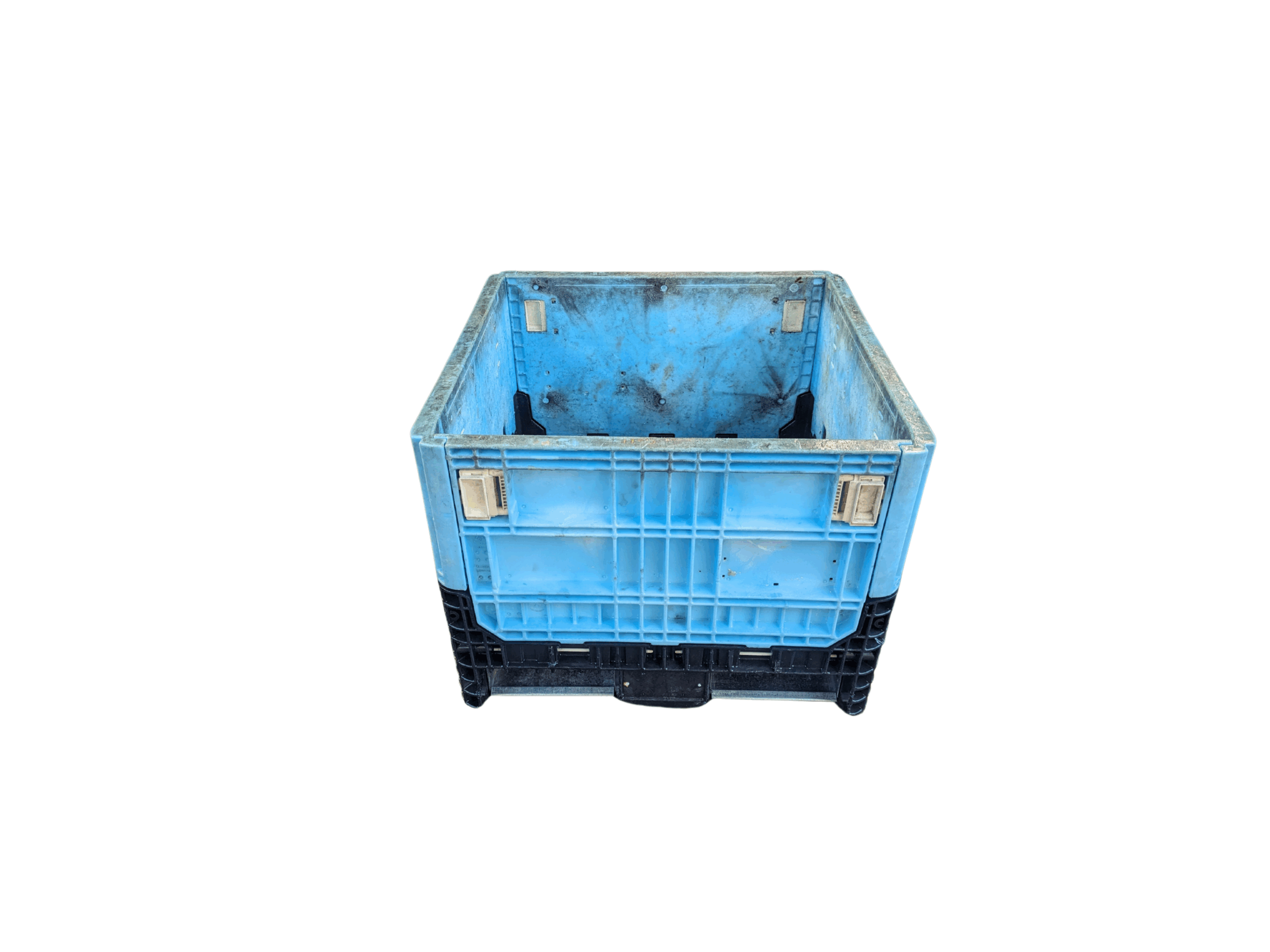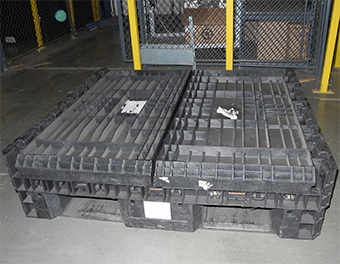The Ultimate Guide to Selecting the Right Mass Containers for Your Organization Requirements
Picking the ideal bulk containers is crucial for any kind of company that depends on effective logistics. Different kinds of containers exist, each developed for certain materials and applications. Aspects such as size, material compatibility, and regulative requirements play a significant role in this decision-making process. Comprehending these aspects can cause boosted functional effectiveness. Numerous businesses forget crucial aspects that can enhance their general performance and sustainability. What are these factors to consider?
Recognizing Different Sorts Of Mass Containers
Mass containers work as essential devices for businesses looking for effective storage space and transport solutions. These containers can be found in different kinds, each designed to fulfill details operational needs. One usual kind is the intermediate bulk container (IBC), which is excellent for liquid and granulated materials, supplying a balance of capacity and maneuverability. An additional preferred alternative is the bulk bag, or FIBC, appropriate for completely dry, flowable products. These versatile containers are light-weight and can be conveniently transported and stored. For heavier products, rigid mass containers are frequently utilized, offering durability and stability for risk-free handling. In addition, there are specific containers tailored for harmful materials, ensuring compliance with security policies. Comprehending the distinctive characteristics of these mass container kinds allows companies to make educated decisions that optimize logistics and decrease expenses. By picking the right container, firms can enhance their operational performance and streamline their supply chain procedures.
Secret Product Factors To Consider for Mass Containers
When choosing mass containers, it is necessary to ponder the materials utilized in their building. Factors such as durability, chemical, and strength compatibility play a critical role in ensuring the containers satisfy certain functional needs. In addition, weight and transportability problems can influence both efficiency and transportation logistics.
Product Longevity and Stamina
Longevity and strength are crucial aspects in picking materials for bulk containers, as they directly influence the container's capacity to endure various ecological conditions and taking care of procedures. Products such as high-density polyethylene (HDPE), polypropylene, and stainless steel are frequently favored for their robust buildings, providing resistance to abrasion, effect, and temperature variations. The choice of material additionally influences the general life expectancy of the container; stronger products normally cause much less frequent replacements, causing set you back savings over time. Additionally, the weight of the product can impact delivery prices and ease of handling. Companies need to consider their particular operational environments and the capacity for deterioration to assure peak durability and toughness in their bulk container choice.
Chemical Compatibility Aspects
Understanding chemical compatibility is vital for selecting bulk containers, as the products utilized need to resist the specific substances they will hold. Different aspects affect compatibility, consisting of the chemical nature of the contents, temperature level, and duration of storage space. For circumstances, harsh chemicals might call for containers made from stainless-steel or specialized plastics that stand up to degradation. Furthermore, responsive materials can create warmth or gases, requiring aired vent or pressure-rated containers. The option of container material, whether metal, polyethylene, or polycarbonate, should line up with the chemical residential or commercial properties of the stored compounds to avoid leakages or violations. Ultimately, a complete analysis of these compatibility factors ensures safe handling and storage space, protecting both personnel and the environment while keeping item honesty.
Weight and Transportability Issues
Picking bulk containers includes not just evaluating chemical compatibility yet additionally considering weight and mobility. Businesses should analyze the ease of handling and transportation to enhance performance. Light-weight materials like high-density polyethylene (HDPE) or aluminum can assist in easier movement and decrease shipping costs. Conversely, much heavier containers may give enhanced resilience but can prevent flexibility, specifically in settings calling for regular relocation. Additionally, the style of the container ought to enable practical lifting and piling, guaranteeing ergonomic safety for employees. Firms need to additionally take into consideration the facilities readily available for transportation; for instance, containers suitable with forklifts or pallet jacks can enhance operations. Ultimately, the best balance between weight and portability straight influences operational efficiency and cost performance.
Sizing Your Bulk Containers for Optimal Effectiveness
When sizing mass containers, organizations should very carefully evaluate the dimensions needed to suit their details products. Additionally, weight capacity is a crucial variable that influences efficiency and security during transportation and storage space. Reliable sizing not just makes the most of space but additionally optimizes operational process.
Establishing Container Capacities
Selecting the appropriate measurements for bulk containers is crucial for maximizing performance in storage space and transportation. Organizations should assess their certain needs, taking into account factors such as available area, the nature of the products being kept, and the techniques of transport made use of. Precise dimensions assure that containers fit preferably in vehicles and warehouses, lessening wasted area and reducing taking care of time. Criterion dimensions can use ease, but customized dimensions could be needed for unique requirements or to suit details items. In addition, it is crucial to evaluate stacking capacities and accessibility, as these aspects affect overall functional effectiveness. Ultimately, the ideal measurements lead to boosted company and streamlined logistics, profiting the total productivity of business.
Weight Capacity Considerations
Comprehending weight capacity is important for companies aiming to maximize their mass container performance. The weight capacity of a container directly affects storage space capacities, transport logistics, and general operational prices. Picking containers with the proper weight limits assures that businesses can securely save and move their items without risking damage or conformity issues. Overwhelming containers can result in architectural failures, while underutilizing capability cause lost resources. When picking containers, it is vital for organizations to assess their item weights and consider any kind of governing requirements. In addition, elements such as the kind of product, planned use, and environmental conditions ought to also affect weight capacity choices. By reviewing these aspects, services can improve performance and assure a structured supply chain.
Governing Compliance and Safety Requirements

Regulative compliance and security criteria play an essential duty in the selection of bulk containers for companies. Organizations must ensure that their containers meet various laws set by regional, nationwide, and international authorities. These standards typically relate to product safety, architectural integrity, and correct labeling, which aid prevent mishaps and guarantee the risk-free transportation of goods.
In addition, adherence to industry-specific standards, such as those from the Fda (FDA) or the Occupational Safety and Health Management (OSHA), is critical for firms dealing with harmful materials or food items. Non-compliance can result in fines, legal concerns, or damage to a service's reputation.
Companies ought to likewise think about the container's compatibility with the materials being stored or transported to stay clear of contamination or chemical responses (used bulk containers). To summarize, comprehending and carrying out governing conformity and safety criteria is crucial for the liable and efficient use bulk containers
Sustainability Options for Eco-Friendly Mass Containers

Companies are also checking out choices made from recycled products, which not only preserve sources but also sustain the reusing industry. Innovations in design permit for lighter containers that need much less power to transportation, further boosting sustainability. By integrating these environment-friendly mass container choices, companies can show their commitment to ecological stewardship while fulfilling consumer demand for lasting methods. This change not just assists the planet however can additionally improve brand online reputation and customer loyalty.
Cost-Effectiveness and Budgeting for Mass Containers
While many services concentrate on sustainability, cost-effectiveness continues to be a crucial aspect when selecting bulk containers. Organizations has to evaluate the click here preliminary acquisition cost, in addition to lasting operational expenses, to assure financial viability. Factors such as reusability, maintenance, and sturdiness play a significant function in establishing overall costs.
Buying high-grade containers might generate greater ahead of time costs but can lead to financial savings with reduced replacement rates and decreased waste. Furthermore, businesses need to consider transportation prices and storage performance, as these can influence the overall budget.

Regularly Asked Inquiries
Just how Do I Identify the Right Container for Hazardous Materials?
To establish the best container for dangerous materials, one should evaluate compatibility with the compound, take into consideration the container's material, check for governing conformity, and assess capacity and safety attributes to assure proper handling and storage space.
Can Bulk Containers Be Personalized for Particular Products?
Yes, bulk containers can be personalized for particular products. used bulk containers. Various features, such as design, product, and dimension, can be tailored to satisfy one-of-a-kind requirements, making sure suitable security and performance for carrying and keeping various products
What Is the Average Life-span of Different Mass Container Kind?
The ordinary lifespan of bulk container kinds differs; plastic containers last 5-10 years, steel containers 10-20 years, and wooden containers normally last 3-7 years, relying on use, upkeep, and environmental conditions.
Exactly how Should I Tidy and Maintain Bulk Containers?
To cleanse and preserve bulk containers, one need to on a regular basis inspect for damage, remove deposit, laundry with appropriate detergents, rinse completely, and assurance correct drying before storage space. Complying with manufacturer standards improves longevity and safety during usage.
Exist Rental Choices for Mass Containers Available?
Yes, countless companies offer rental alternatives for bulk containers, giving versatility for services. These rentals can accommodate various needs, permitting firms to take care of stock effectively without the dedication of purchasing containers outright.
Toughness and strength are critical factors in choosing products for bulk containers, as they straight influence the container's capacity to stand up to different environmental conditions and taking care of procedures. Recognizing chemical compatibility is important for picking bulk containers, as the products made use of have to stand up to the particular materials they will hold. Understanding weight ability is vital for businesses aiming to maximize their mass container effectiveness. Governing compliance and security requirements play a crucial function in the selection of mass containers for businesses. While numerous services concentrate on sustainability, cost-effectiveness continues to be a vital aspect when picking bulk containers.